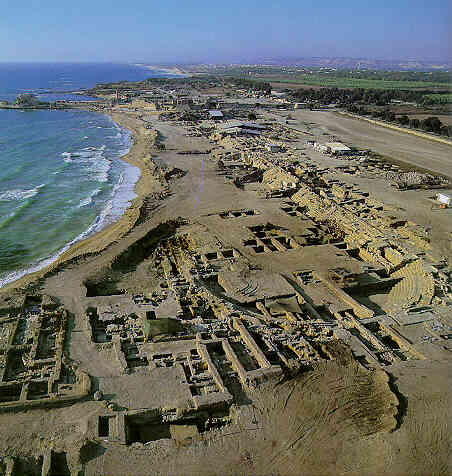
CAESAREA.
FOLLOWING the Mediterranean coast north from Jaffa, after about two hours ride, the traveler comes upon the ruins of what seems once to have been a city of no small importance. The guide says that this is all that remains of Caesarea, sometimes called Caesarea Palestina to distinguish it from Caesarea Philippi, far north under the shadow of Mount Hermon. The ruins of the town lie close along the winding shore, projecting here and there into the sea, and presenting huge masses of shattered masonry and piles of granite columns to the restless waves. Remains of two great moles, which once formed the harbor, stretch out into the sea; but one is almost entirely destroyed, and the other broken and shattered, so that the once famous port is filled with drifted sand, and not even a fishing boat would be safe here in a storm. On the southern mole are the remains of an old fortress, which once served as a defense to the harbor. There is also a ruined wall, inclosing a space some eighty rods north and south by forty east and west. The wall, which was of small but well-cut stones, was strengthened by sixteen square towers, and protected by a broad ditch; but it could not have surrounded more than the citadel of the old town, for we cannot suppose that its vast population, stated as high as two hundred thousand, was confined in so small a space. There are abundant traces of suburbs scattered all over the plain, and extending along the shore for two miles or more.
Within the wall's, all is in ruin. Not a building remains entire; confused heaps of stone and rubbish are seen, with here and there a solitary column or a disjointed arch, or a fragment of a wall, all overgrown with thistles and brambles. In the southern wall of the citadel is a gateway still almost entire, and on a rising ground a little within it stand four massive buttresses, the remains of a cathedral and the most conspicuous thing among the ruins. The view given in the picture is from the north.
It is not a pleasant place to linger after nightfall, as the scene is, even in the broad sunlight, dreary and desolate beyond description. No sign of life is to be seen on any side; and the sighing of the wind among the broken walls, the deep moan of the sea as each wave breaks upon the ruins of the ancient harbor, are the only sounds to be heard.
Even the wandering Arab seems to avoid the spot; and one traveler says that the only living creature that he saw there during his stay of two days was a jackal in one of the crypts of the cathedral. In the days of the apostles, Caesarea was the capital of Palestine, and the favorite residence of Herod Agrippa, who imprisoned Peter, and "killed James the brother of John with the sword." It had been built up by Herod the Great, from an insignificant place to a splendid city. He set out to make it the finest city in Palestine, and in this he succeeded. He was twelve years in building a wall around it and decorating it with beautiful and costly buildings of white marble, though it is not thought that the remains of the wall now standing is the one built by Herod. He also built the artificial Harbor, to which reference has been made.
The city was named Caesarea, in honor of Augustus Caesar, under whom Herod held his power, and whom he was very anxious to please. There was a theater (probably the same from which Herod Agrippa was afterward carried out to die), and an amphitheater, with aqueducts for the conveyance of water, and a temple dedicated to Caesar, and many other splendid buildings. Caesarea was decidedly a Roman city, yet it was intimately connected with the history of the early Christian church. Peter here first preached the gospel to the Gentiles, and here he baptized Cornelius, the first Gentile convert. It was to Caesarea that Paul was brought a prisoner from Jerusalem. It was in the palace of this city that he so spake of "righteousness, temperance, and Judgment to come" that he made Felix tremble; and here it was that his eloquence forced King Agrippa to exclaim, "Almost thou persuadest me to be a Christian." And it was from this city that he embarked on that last long and eventful journey to Rome.
Here also it was that Eusebius, the historian so often quoted in church history, spent nearly his whole life. Another great historian, named Procopius, was born here in the beginning of the sixth century. Truly the place is rich in memories as well as ruins!
E. B. G.